- Home
- Dennis Lehane
Shutter Island Page 8
Shutter Island Read online
Page 8
“What’s that, Marshal?”
“Sit around over drinks and, um, probe people?”
“Occupational hazard, I guess. How many psychiatrists does it take to screw in a lightbulb?”
“I don’t know. How many?”
“Eight.”
“Why?”
“Oh, stop overanalyzing it.”
Teddy caught Chuck’s eyes and they both laughed.
“Shrink humor,” Chuck said. “Who would’ve guessed?”
“You know what the state of the mental health field is these days, gentlemen?”
“Not a clue,” Teddy said.
“Warfare,” Cawley said and yawned into his damp handkerchief. “Ideological, philosophical, and yes, even psychological warfare.”
“You’re doctors,” Chuck said. “You’re supposed to play nice, share your toys.”
Cawley smiled and they passed the orderly on the second-floor landing. From somewhere below, a patient screamed, and the echo fled up the stairs toward them. It was a plaintive howl, and yet Teddy could hear the hopelessness in it, the certainty it carried that whatever it longed for was not going to be granted.
“The old school,” Cawley said, “believes in shock therapy, partial lobotomies, spa treatments for the most docile patients. Psychosurgery is what we call it. The new school is enamored of psychopharmacology. It’s the future, they say. Maybe it is. I don’t know.”
He paused, a hand on the banister, midway between the second floor and the third, and Teddy could feel his exhaustion as a living, broken thing, a fourth body in the stairwell with them.
“How does psychopharmacology apply?” Chuck asked.
Cawley said, “A drug has just been approved—lithium is its name—that relaxes psychotic patients, tames them, some would say. Manacles will become a thing of the past. Chains, handcuffs. Bars even, or so the optimists say. The old school, of course, argues that nothing will replace psychosurgery, but the new school is stronger, I think, and it will have money behind it.”
“Money from where?”
“Pharmaceutical companies, of course. Buy stock now, gentlemen, and you’ll be able to retire to your own island. New schools, old schools. My god, I do rant sometimes.”
“Which school are you?” Teddy asked gently.
“Believe it or not, Marshal, I believe in talk therapy, basic interpersonal skills. I have this radical idea that if you treat a patient with respect and listen to what he’s trying to tell you, you just might reach him.”
Another howl. Same woman, Teddy was pretty sure. It slid between them on the stairs and seemed to spike Cawley’s attention.
“But these patients?” Teddy said.
Cawley smiled. “Well, yes, many of these patients need to be medicated and some need to be manacled. No argument. But it’s a slippery slope. Once you introduce the poison into the well, how do you ever get it out of the water?”
“You don’t,” Teddy said.
He nodded. “That’s right. What should be the last resort gradually becomes standard response. And, I know, I’m mixing my metaphors. Sleep,” he said to Chuck. “Right. I’ll try that next time.”
“I’ve heard it works wonders,” Chuck said, and they headed up the final flight.
In Rachel’s room, Cawley sat heavily on the edge of her bed and Chuck leaned against the door. Chuck said, “Hey. How many surrealists does it take to screw in a lightbulb?”
Cawley looked over at him. “I’ll bite. How many?”
“Fish,” Chuck said and let loose a bright bark of a laugh.
“You’ll grow up someday, Marshal,” Cawley said. “Won’t you?”
“I’ve got my doubts.”
Teddy held the sheet of paper in front of his chest and tapped it to get their attention. “Take another look.”
THE LAW OF 4
I AM 47
THEY WERE 80
+YOU ARE 3
WE ARE 4
BUT
WHO IS 67?
After a minute, Cawley said, “I’m too tired, Marshal. It’s all gibberish to me right now. Sorry.”
Teddy looked at Chuck. Chuck shook his head.
Teddy said, “It was the plus sign that got me going, made me look at it again. Look at the line under ’They were eighty.’ We’re supposed to add the two lines. What do you get?”
“A hundred and twenty-seven.”
“One, two, and seven,” Teddy said. “Right. Now you add three. But it’s separated. She wants us to keep the integers apart. So you have one plus two plus seven plus three. What’s that give you?”
“Thirteen.” Cawley sat up on the bed a bit.
Teddy nodded. “Does thirteen have any particular relevance to Rachel Solando? Was she born on the thirteenth? Married on it? Killed her kids on the thirteenth?”
“I’d have to check,” Cawley said. “But thirteen is often a significant number to schizophrenics.”
“Why?”
He shrugged. “The same way it is to many people. It’s a harbinger of bad luck. Most schizophrenics live in a state of fear. It’s the common bonding element in the disease. So most schizophrenics are also deeply superstitious. Thirteen plays into that.”
“That makes sense, then,” Teddy said. “Look at the next number. Four. Add one plus three you get four. But one and three on their own?”
“Thirteen.” Chuck came off the wall and cocked his head at the sheet of paper.
“And the last number,” Cawley said. “Sixty-seven. Six and seven equals thirteen.”
Teddy nodded. “It’s not the ’law of four.’ It’s the law of thirteen. There are thirteen letters in the name Rachel Solando.”
Teddy watched both Cawley and Chuck count it up in their heads. Cawley said, “Go on.”
“Once we’ve accepted that, Rachel leaves a whole lot of bread crumbs. The code follows the most rudimentary principle of number-to-letter assignation. One equals A. Two equals B. You with me?”
Cawley nodded, followed by Chuck a few seconds later.
“The first letter of her name is R. Numerical assignation of R is eighteen. A is one. C is three. H is eight. E is five. L is twelve. Eighteen, one, three, eight, five, and twelve. Add ’em up, guys, and what do you get?”
“Jesus,” Cawley said softly.
“Forty-seven,” Chuck said, his eyes gone wide, staring at the sheet of paper over Teddy’s chest.
“That’s the ’I,’” Cawley said. “Her first name. I get that now. But what about ’they’?”
“Her last name,” Teddy said. “It’s theirs.”
“Whose?”
“Her husband’s family and their ancestors. It’s not hers, not by birth. Or it refers to her children. In either case, it doesn’t really matter, the whys. It’s her last name. Solando. Take the letters and add up their numerical assignations and, yeah, trust me, you come up with eighty.”
Cawley came off the bed, and both he and Chuck stood in front of Teddy to look at the code draped over his chest.
Chuck looked up after a while, into Teddy’s eyes. “What’re you—fucking Einstein?”
“Have you broken code before, Marshal?” Cawley said, eyes still on the sheet of paper. “In the war?”
“No.”
“So how did you…?” Chuck said.
Teddy’s arms were tired from holding up the sheet. He placed it on the bed.
“I don’t know. I do a lot of crosswords. I like puzzles.” He shrugged.
Cawley said, “But you were Army Intelligence overseas, right?”
Teddy shook his head. “Regular army. You, though, Doctor, you were OSS.”
Cawley said, “No. I did some consulting.”
“What kind of consulting?”
Cawley gave him that sliding smile of his, gone almost as soon as it appeared. “The never-talk-about-it kind.”
“But this code,” Teddy said, “it’s pretty simple.”
“Simple?” Chuck said. “You’ve explained it, and my head still
hurts.”
“But for you, Doctor?”
Cawley shrugged. “What can I tell you, Marshal? I wasn’t a code breaker.”
Cawley bent his head and stroked his chin as he turned his attention back to the code. Chuck caught Teddy’s eyes, his own filled with question marks.
Cawley said, “So we’ve figured out—well, you have, Marshal—the forty-seven and the eighty. We’ve ascertained that all clues are permutations of the number thirteen. What about the ’three’?”
“Again,” Teddy said, “it either refers to us, in which case she’s clairvoyant…”
“Not likely.”
“Or it refers to her children.”
“I’ll buy that.”
“Add Rachel to the three…”
“And you get the next line,” Cawley said. “’We are four.’”
“So who’s sixty-seven?”
Cawley looked at him. “You’re not being rhetorical?”
Teddy shook his head.
Cawley ran his finger down the right side of the paper. “None of the numbers add up to sixty-seven?”
“Nope.”
Cawley ran a palm over the top of his head and straightened. “And you have no theories?”
Teddy said, “It’s the one I can’t break. Whatever it refers to isn’t anything I’m familiar with, which makes me think it’s something on this island. You, Doctor?”
“Me, what?”
“Have any theories?”
“None. I wouldn’t have gotten past the first line.”
“You said that, yeah. Tired and all.”
“Very tired, Marshal.” He said it with his gaze fixed on Teddy’s face, and then he crossed to the window, watched the rain sluice down it, the sheets so thick they walled off the land on the other side. “You said last night that you’d be leaving.”
“First ferry out,” Teddy said, riding the bluff.
“There won’t be one today. I’m pretty sure of that.”
“So tomorrow, then. Or the next day,” Teddy said. “You still think she’s out there? In this?”
“No,” Cawley said. “I don’t.”
“So where?”
He sighed. “I don’t know, Marshal. It’s not my specialty.”
Teddy lifted the sheet of paper off the bed. “This is a template. A guide for deciphering future codes. I’d bet a month’s salary on it.”
“And if it is?”
“Then she’s not trying to escape, Doctor. She brought us here. I think there’s more of these.”
“Not in this room,” Cawley said.
“No. But maybe in this building. Or maybe out on the island.”
Cawley sucked the air of the room into his nostrils, steadying one hand against the windowsill, the man all but dead on his feet, making Teddy wonder what really had kept him up last night.
“She brought you here?” Cawley said. “To what end?”
“You tell me.”
Cawley closed his eyes and stayed silent for so long that Teddy began to wonder if he’d fallen asleep.
He opened his eyes again, looked at both of them. “I’ve got a full day. I’ve got staff meetings, budget meetings with the overseers, emergency maintenance meetings in case this storm really hits us. You’ll be happy to know I’ve arranged for you both to speak with all of the patients who were in group therapy with Miss Solando the night she disappeared. Those interviews are scheduled to begin in fifteen minutes. Gentlemen, I appreciate you being here. I do. I’m jumping through as many hoops as I can, whether it appears so or not.”
“Then give me Dr. Sheehan’s personnel file.”
“I can’t do that. I absolutely cannot.” He leaned his head back against the wall. “Marshal, I’ve got the switchboard operator trying his number on a steady basis. But we can’t reach anyone right now. For all we know, the whole eastern seaboard is underwater. Patience, gentlemen. That’s all I’m asking. We’ll find Rachel, or we’ll find out what happened to her.” He looked at his watch. “I’m late. Is there anything else, or can it wait?”
THEY STOOD UNDER an awning outside the hospital, the rain sweeping across their field of vision in sheets the size of train cars.
“You think he knows what sixty-seven means?” Chuck said.
“Yup.”
“You think he broke the code before you did?”
“I think he was OSS. I think he’s got a gift or two in that department.”
Chuck wiped his face, flicked his fingers toward the pavement. “How many patients they got here?”
“It’s small,” Teddy said.
“Yeah.”
“What, maybe twenty women, thirty guys?”
“Not many.”
“No.”
“Not quite sixty-seven anyway.”
Teddy turned, looked at him. “But…,” he said.
“Yeah,” Chuck said. “But.”
And they looked off at the tree line and beyond, at the top of the fort pressed back behind the squall, gone fuzzy and indistinct like a charcoal sketch in a smoky room.
Teddy remembered what Dolores had said in the dream—Count the beds.
“How many they got up there, you think?”
“I don’t know,” Chuck said. “We’ll have to ask the helpful doctor.”
“Oh, yeah, he just screams ’helpful,’ don’t he?”
“Hey, boss.”
“Yeah.”
“In your life, have you ever come across this much wasted federal space?”
“How so?”
“Fifty patients in these two wards? What do you think these buildings could hold? A couple hundred more?”
“At least.”
“And the staff-to-patient ratio. It’s like two-to-one favoring staff. You ever seen anything like that?”
“I gotta say no to that one.”
They looked at the grounds sizzling underwater.
“What the fuck is this place?” Chuck said.
THEY HELD THE interviews in the cafeteria, Chuck and Teddy sitting at a table in the rear. Two orderlies sat within shouting distance, and Trey Washington was in charge of leading the patients to them and then taking them away when they were through.
The first guy was a stubbled wreck of tics and eye blinks. He sat hunched into himself like a horseshoe crab, scratching his arms, and refused to meet their eyes.
Teddy looked down at the top page in the file Cawley had provided—just thumbnail sketches from Cawley’s own memory, not the actual patient files. This guy was listed first and his name was Ken Gage and he was in here because he’d attacked a stranger in the aisle of a corner grocery store, beat the victim on the head with a can of peas, all the time saying, in a very subdued voice, “Stop reading my mail.”
“So, Ken,” Chuck said, “how you doing?”
“I got a cold. I got a cold in my feet.”
“Sorry to hear that.”
“It hurts to walk, yeah.” Ken scratched around the edges of a scab on his arm, delicately at first, as if tracing a moat for it.
“Were you in group therapy the night before last?”
“I got a cold in my feet and it hurts to walk.”
“You want some socks?” Teddy tried. He noticed the two orderlies looking over at them, snickering.
“Yeah, I want some socks, I want some socks, I want some socks.” Whispering it, head down and bobbing a bit.
“Well, we’ll get you some in a minute. We just need to know if you were—”
“It’s just so cold. In my feet? It’s cold and it hurts to walk.”
Teddy looked over at Chuck. Chuck smiled at the orderlies as the sound of their giggles floated to the table.
“Ken,” Chuck said. “Ken, can you look at me?”
Ken kept his head down, bobbing a bit more. His fingernail tore open the scab and a small line of blood seeped into the hairs of his arm.
“Ken?”
“I can’t walk. Not like this, not like this. It’s so cold, cold, cold.”
/> “Ken, come on, look at me.”
Ken brought his fists down on the table.
Both orderlies stood and Ken said, “It shouldn’t hurt. It shouldn’t. But they want it to. They fill the air with cold. They fill my kneecaps.”
The orderlies crossed to their table, looked over Ken at Chuck. The white one said, “You guys about done, or you want to hear more about his feet?”
“My feet are cold.”
The black orderly raised an eyebrow. “It’s okay, Kenny. We’ll take you to Hydro, warm you right up.”
The white one said, “I been here five years. Topic don’t change.”
“Ever?” Teddy said.
“It hurts to walk.”
“Ever,” the orderly said.
“Hurts to walk ’cause they put cold in my feet…”
THE NEXT ONE, Peter Breene, was twenty-six, blond, and pudgy. A knuckle-cracker and a nail-biter.
“What are you here for, Peter?”
Peter looked across the table at Teddy and Chuck with eyes that seemed permanently damp. “I’m scared all the time.”
“Of what?”
“Things.”
“Okay.”
Peter propped his left ankle up on his right knee, gripped the ankle, and leaned forward. “It sounds stupid, but I’m afraid of watches. The ticking. It gets in your head. Rats terrify me.”
“Me too,” Chuck said.
“Yeah?” Peter brightened.
“Hell, yeah. Squeaky bastards. I get the piss-shivers just looking at one.”
“Don’t go out past the wall at night, then,” Peter said. “They’re everywhere.”
“Good to know. Thanks.”
“Pencils,” Peter said. “The lead, you know? The scratch-scratch on the paper. I’m afraid of you.”
“Me?”
“No,” Peter said, pointing his chin at Teddy. “Him.”
“Why?” Teddy asked.
He shrugged. “You’re big. Mean-looking crew cut. You can handle yourself. Your knuckles are scarred. My father was like that. He didn’t have the scars. His hands were smooth. But he was mean-looking. My brothers too. They used to beat me up.”
“I’m not going to beat you up,” Teddy said.
“But you could. Don’t you see? You have that power. And I don’t. And that makes me vulnerable. Being vulnerable makes me scared.”
“And when you get scared?”
Peter gripped his ankle and rocked back and forth, his bangs falling down his forehead. “She was nice. I didn’t mean anything. But she scared me with her big breasts, the way her can moved in that white dress, coming to our house every day. She’d look at me like…You know the smile you give a child? She’d give me that smile. And she was my age. Oh, okay, maybe a few years older, but still, in her twenties. And she had so much sexual knowledge. It was apparent in her eyes. She liked to be naked. She’d sucked cock. And then she asks me, as if she can have a glass of water. She’s alone in the kitchen with me, as if that’s no big deal?”

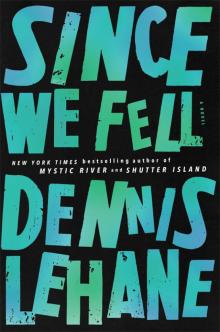 Since We Fell
Since We Fell Prayers for Rain
Prayers for Rain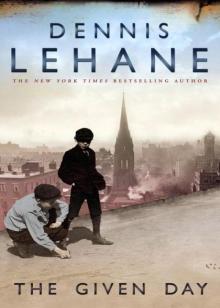 The Given Day
The Given Day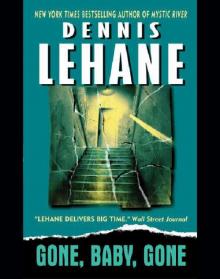 Gone, Baby, Gone
Gone, Baby, Gone Mystic River
Mystic River A Drink Before the War
A Drink Before the War Shutter Island
Shutter Island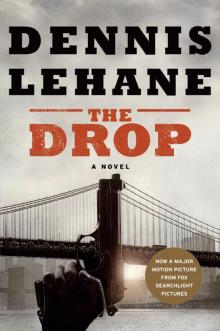 The Drop
The Drop Moonlight Mile
Moonlight Mile Sacred
Sacred World Gone By
World Gone By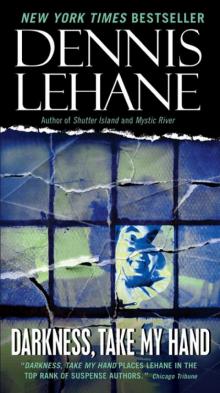 Darkness, Take My Hand
Darkness, Take My Hand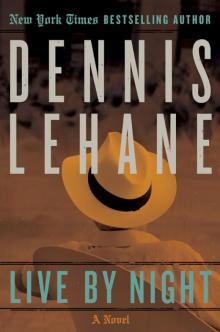 Live by Night
Live by Night World Gone By: A Novel
World Gone By: A Novel Coronado
Coronado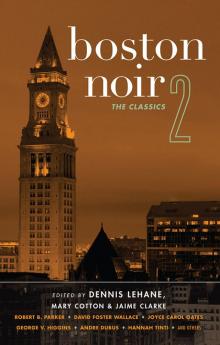 Boston Noir 2
Boston Noir 2 World Gone By: A Novel (Joe Coughlin Series)
World Gone By: A Novel (Joe Coughlin Series)